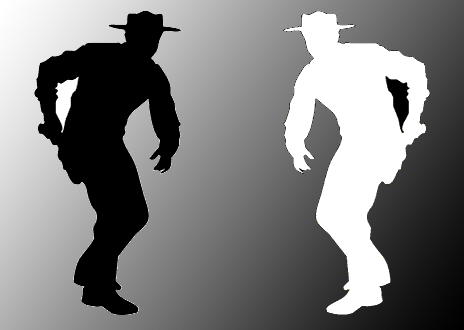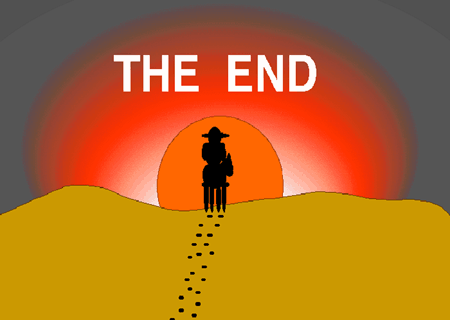Sunday, November 16: The A.D.D. Detective
HOLLYWOOD MUSTS
by Leigh Lundin
Tony Harris wrote us about clichés used in movies, particularly thrillers and suspense, and today’s column grew out of that discussion. Many of the following examples come from Tony himself.
 Clichés
Clichés
Like the happy and sad theatrical masks from Greek theatre, clichés form a kind of shorthand to clue the audience who the characters were. Without wasting valuable celluloid, black hats and white hats tipped the audience to the good guys and the bad.
Clichés continued to evolve. We’ve seen movies where a woman enters her apartment, setting down a paper sack with a thin baguette sticking out it. The cliché of the baguette shows us she’s been grocery shopping, without a word or screen shot of what’s in the bag.
Likewise, we’ve become so urbanized that Hollywood doesn’t burden themselves with realism. Red-tail hawks bring up images of American Indians, even where not appropriate.
Jim Carrey’s Ace Ventura: When Nature Calls was supposedly set in Africa, although the elephants and tigers were Asian, not African. In the silly 1980 Blue Lagoon remake remake, the movie utilized a bizarre array of animals from multiple continents. Wranglers even daubed paint on docile iguanas to give them an exotic appearance.
Product Placement
Writers use name brands as shorthand to telling us about a character’s wealth, social position, or their presumed taste. Wealthy adventurers always wear Rolex Oysters. The rich shop at Tiffany’s or Cartier.
All the best spies use Apple Computers and Sony cameras. Federal agents drive Fords while Mr. and Mrs. Yuppie drive SUVs. It’s become recognized that in movies, if not in print, companies vie for this product placement. And clothing labels… Let’s not even discuss them.
Occasionally the advertising is so overt, it’s jarring and out-of-place. I can’t recall the plot of a single episode of Magnum PI, but I remember Magnum and Higgins sitting under a table umbrella dipping into a ghastly, oversized tub of Country Crock.
Expectations
Clichés are not always the fault of writers and directors, and the line blurs between clichés and expectations. Audiences have clear preferences, particularly when it comes to HEA, "happily ever after". Some of these expectations include:
- The hero never dies.
- The guy always gets the girl (or girl gets the guy).
- They ride off into the sunset.
As writers, we try both to avoid clichés and exploit them. Sometimes we even have fun with them. In that spirit, here’s more on clichés, particularly from crime shows:
Death and Dying
- Guns and rifles can fire forever without reloading. If a gun runs out of ammo, there is always another nearby.
- When anyone dies, they remain conscious until the last dramatic moment, at which point they close their eyes and give their head a quick snap to the side.
- The black guy always gets killed first.
- Noir protagonists are self-destructive alcoholics.
Cops
- In cop movies, the captain or lieutenant tells his detective to get off the case. The investigator never obeys.
- If the superior is black, the detective will be white, and vice versa.
- When cops need to solve a crime, they always gather critical information at strip clubs.
Crime
- Anyone can pick a lock with something in their pocket in under 5 seconds.
- Anyone can crack a safe by putting their ear against it.
- No one ever gets cut when diving through windows.
EMT
- No EMT rescuer attempts CPR. Load ’em up, move ’em out.
- It the hero uses CPR upon girlfriend or best buddy, they assuredly die.
- ER doctors call out "Stat!" while taking blood pressure, temperature, and internal exams.
- Hospital workers have more affairs than the rest of us.
Cars
- Everyone knows how to hot-wire cars.
- Old cars are always dirty.
- New cars never get dirty.
- Cars in movies never have trouble parking. They always get a spot right in front of their destination.
- People run across busy streets and not get hit– unless it’s a suspect with valuable information.
- Cars always roll over and explode during accidents.
- When told to stay in the car, the amateur never does.
Sex
- The basic plot of movies calls for guy to get girl into bed.
- If a girl already has a guy, she wants a different one.
- When the guy already has a girl, he wants another one.
- No one worries about STDs.
Bombs
- Anyone can disarm a bomb.
- An externally visible digital clock counts down in red digits.
- The bomb is always disarmed within the last few seconds by cutting the red wire.
- Whenever the bad guy holds a "dead man" switch (one that will set off a bomb if let go) the good guy wrestles him for it, and together they will perform spectacular fights, stunts, and other gymnastics, falling down stairs and rolling out of the way of gunfire. During all this action, the switch never releases.
- When the bad guy deliberately throws the switch, he smirks evilly.
Ventilation Ducts
- They’re always big enough to crawl through.
- They’re spotlessly clean.
- They always lead to where the crawler wants to go.
Men
- If a male is smart, he’s nerdy and not good-looking.
- If he’s good-looking, he’s not nerdy or smart.
- Any male can
- drive a Formula I car,
- drink to excess and still function normally,
- diagnose a broken-down engine by looking at it,
- hit a moving target at 600 meters.
Heroes
- Brains are excess baggage in action heroes.
- Heroes are dazzlingly good-looking.
- A hero can have 15 orgasms per hour.
- Heroes never have gambling problems because, against all odds, they invariably win.
Women
- In made-for-TV movies,
- the rule is: Women good, Men bad.
- non-blonde women are an order of magnitude smarter than men.
- Women either leave their doors unlocked or have crappy locks.
- Television women wear bras to bed.
- Women who commit horrid crimes have excellent reasons.
Hair
- Women are blonde, unless they are educated.
- If a woman is a doctor or a librarian, she wears glasses and has her hair in a bun.
- Redheads run the gamut from feisty to angry.
- Everyone is beautiful, even when they just get out of bed.
Our Own Expectations
Tony Harris says no matter how sophisticated we are, there’re two things we still expect in movies:
- Movie II, the sequel, is never as good as movie I.
- No matter what the rating or content of a movie, people bring their kids.





















All too true, but is it good or bad?
In a series I seem to have been writing forever I noticed the protagonist was beginning to spout one cliche after another. Someone was always “barking up the wrong tree” or feeling “fit as a fiddle.” This had become so much a part of his nature that the narrator of the stories began commenting on it. Now I have painted myself into a corner. The narrator dare not utter a cliche and the frequently obnoxious protagonist can’t think of any when one is called for. Life is hard.
If you don’t want to talk about clothing, how about shoes?
As for your statement about blondes I resemble that remark. So there.
I laughed through most of your article because we as viewers and readers sure are easy to please, aren’t we?
I loved it! (Especially since I just read an article saying the new James Bond film yanked out all the expected stuff, no bed hopping, no Q, no “Bond. James Bond…”)